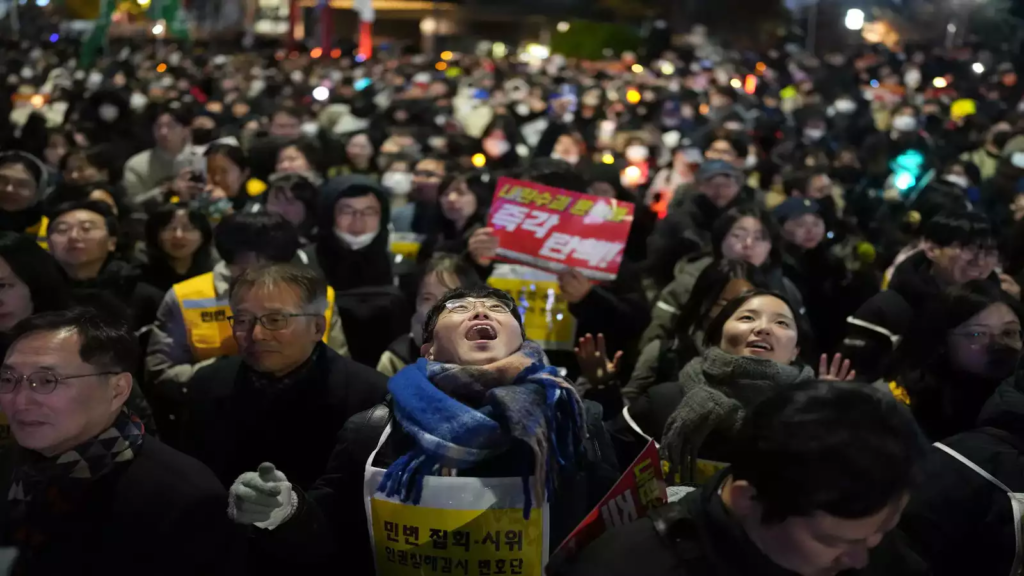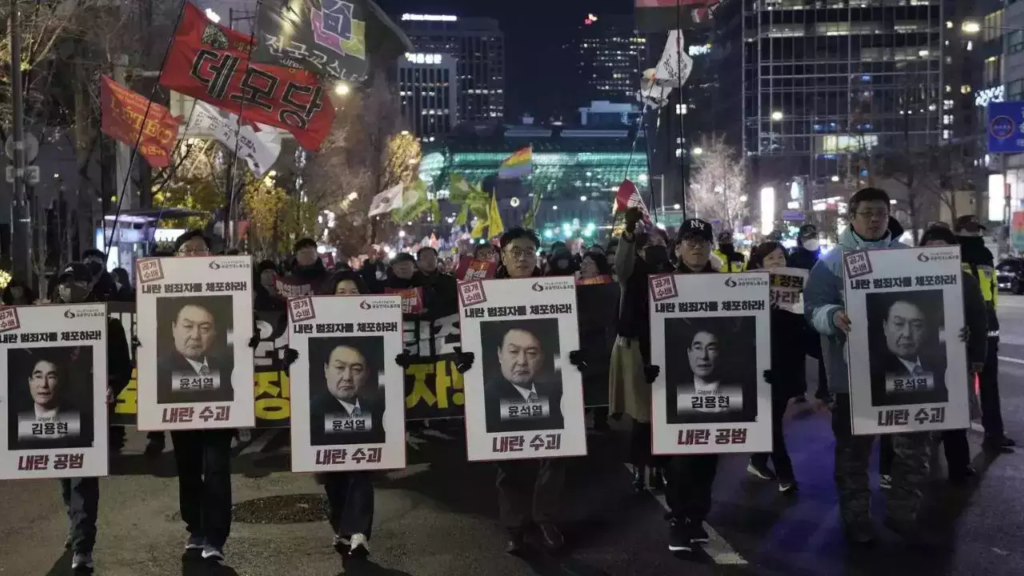South Korea finds itself at a critical juncture as political turmoil deepens following President Yoon Suk Yeol’s declaration of martial law.
The unprecedented move has sparked massive protests, with citizens and lawmakers alike questioning the president’s commitment to democratic principles.
Martial Law: A Nation in Shock
President Yoon’s declaration of martial law on Tuesday sent shockwaves across South Korea. It marked the first time since 1980 that such an extreme measure had been imposed, igniting fears of democratic backsliding in one of Asia’s most vibrant democracies. The move saw troops and helicopters deployed to the National Assembly, an act perceived by many as an attempted coup.
The immediate backlash was swift and intense. Lawmakers convened an emergency session and voted down the martial law decree in the early hours of Wednesday, forcing Yoon to retract his decision.
However, the damage was already done. Public outrage erupted, with tens of thousands gathering outside the National Assembly to demand Yoon’s resignation. By Saturday, the crowd had swelled to an estimated 150,000, with organizers claiming the number exceeded one million.
Read : South Korea President Declares Emergency Martial Law
Protesters carried banners reading “Impeach Yoon” and “Insurrection Criminal” while chanting slogans that reinforced South Korea’s identity as a democratic republic.
Read : North Korea Sends Poop-Filled Balloons to South Korea: A New Low in Escalating Tensions
Despite the withdrawal of martial law, the incident underscored a profound erosion of trust in Yoon’s leadership. The demonstrations continued to gain momentum as opposition parties pushed for his impeachment, accusing him of attempting to undermine civilian rule.
Failed Impeachment and Escalating Protests
The opposition-controlled National Assembly brought forth an impeachment motion against Yoon, requiring a two-thirds majority or 200 votes out of 300.
Despite holding 192 seats, the opposition fell short as the ruling conservative People Power Party (PPP) largely boycotted the vote. Only three PPP lawmakers participated, ensuring the motion’s defeat before a formal count.
The failure to impeach Yoon further enraged the protesters gathered outside parliament. Many had been closely following the proceedings on giant screens, hoping for a resolution. The rejection of an additional bill to investigate allegations against First Lady Kim Keon Hee added to their frustration.

Speakers at the rally expressed deep disappointment but also unwavering resolve. “I feel terrible that it has come to this,” said 24-year-old demonstrator An Jun-cheol. “What the ruling party lawmakers did today—walking away from the vote—is nothing more than an attempt to cement their power and status.”
Opposition leaders vowed to bring the impeachment motion back to the floor. The Democratic Party of Korea (DPK) accused Yoon of being a “dangerous individual” whose continued tenure posed a grave threat to the country’s democracy.
Parliamentary leader Park Chan-dae declared, “If he remains in power, the economic, diplomatic, and security crises we face will only deepen.”
Meanwhile, pro-Yoon supporters held their own rallies, albeit in smaller numbers, underscoring the polarized nature of South Korean politics.
Democracy at a Crossroads
President Yoon’s short-lived martial law decree and subsequent apology have done little to quell the unrest. While he promised not to attempt such measures again, his refusal to resign has only heightened tensions. Critics argue that Yoon’s actions reveal a fundamental disregard for democratic norms.
Legal and political experts have raised serious concerns about the president’s intentions and mental state. Professor Yoon Sung-suk from Chonnam National University criticized Yoon’s proposal to shorten his term and share power as “insufficient.” He emphasized that the president’s alleged coup attempt warranted immediate legal and political consequences.

Professor Kang Won-taek of Seoul National University echoed these sentiments, warning that Yoon’s continued leadership could exacerbate the country’s geopolitical and economic challenges. “The crime of rebellion cannot be ignored indefinitely,” Kang stated.
Adding to the complexity is the fractured state of the ruling PPP. While many party members criticized Yoon’s martial law declaration, they remain reluctant to support impeachment due to fears of losing the presidency to the liberal opposition. This internal conflict has further deepened public disillusionment with the political establishment.
As protests show no signs of abating, South Korea faces an uncertain future. The opposition plans to reintroduce the impeachment motion, betting on defections from the PPP to secure the necessary votes. However, even if successful, the road to political stability will be fraught with challenges.

For many South Koreans, the fight for democracy has become a personal mission. Protesters like Jo Ah-gyeong, a 30-year-old from Seoul, have vowed to continue attending rallies until Yoon is removed from office. “I’m neither discouraged nor disappointed,” she said. “Because we’ll get it eventually.”
The political crisis engulfing South Korea is a stark reminder of the fragility of democracy, even in nations with strong democratic traditions. President Yoon Suk Yeol’s martial law gambit has exposed deep divisions within the government and society, raising urgent questions about the country’s future.
As citizens continue to rally for justice and accountability, the resilience of South Korea’s democratic institutions will be put to the test. Whether through impeachment or other means, the demand for Yoon’s resignation reflects a broader struggle to uphold the principles of democracy in the face of unprecedented challenges.

